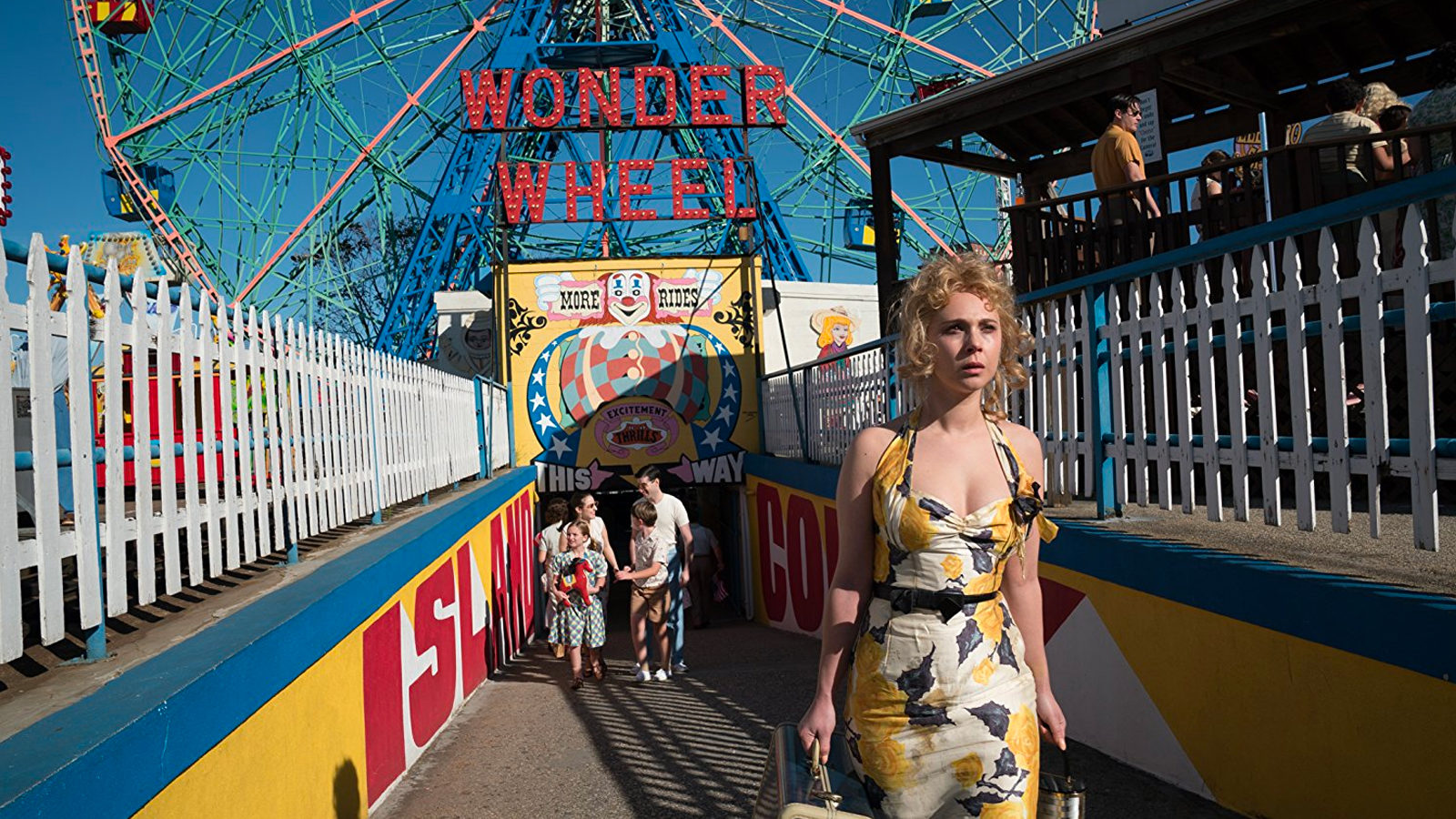The following review is coverage for the New York Film Festival.
Woody Allen, year after year, has been heralded for his work with actors, somehow miraculously getting the best performances possible out of his performers. His biting dialogue being the miracle fruit, people ranging from Scarlett Johansson to Andrew Dice Clay are chomping at the bit to deliver it. That’s why Wonder Wheel strikes me as a huge misfire on his part. For the first time in a very long time, I can’t recall a genuine performance being milked from one of Allen’s concepts. It’s his newest take on the form of a play, to an extent, most of the inciting incidents and revelations carried out in the same interior settings. Despite the lascivious production design and breathtaking work by cinematographer Vittorio Storaro, what’s left is a hollow and shallow retread of Allen’s earlier, much better work.
It’s the 1950s in Coney Island, which is portrayed as a sort of fantasy-cum-reality land where carnival workers scrape by on making scraps and waitresses slave over their humdrum existence unhappily. We’re introduced to Ginny (Kate Winslet) as the county ne’er-do-well as she slings fried clams at the local fried food joint for less-than-appreciative tourists. Her husband, Humpty (Jim Belushi), on and off the wagon depending on if he can conjure up a good enough excuse to drink. The arrival of Humpty’s estranged daughter (Juno Temple) and Ginny’s affair with the local lifeguard (Justin Timberlake) acts as a catalyst for everyone’s momentary escape from reality. There are costs for feeding into your worst impulses, as we soon learn.
If we’re to talk about the performances, then we should probably start with the dialogue they’re given. Allen’s obsession with A Streetcar Named Desire is taken to the limit here, as Humpty and Ginny really just a lame shade of the Kowalskis in Tennessee Williams’s legendary play. The yearning for better things takes the thematic forefront in Wonder Wheel, nearly drowning out anything unrelated to that main theme. Winslet’s Ginny is so much a projection of what Allen believes to be a complex woman. Ginny’s emotions for Timberlake’s Mickey Rubin escalate further into straight emotional fervor, digging up years of broken dreams and resentment resulting in pettiness. But with Winslet’s performance bordering on straight histrionics and Allen’s direction feeding into the worst impulses of the character, none of this seems much more than an acting workshop. Monologue after monologue makes every feeling text, not letting the performer make things more complex with just line after line of dialogue said with faux prestige bravura.
That isn’t to discount how beautiful the whole thing is. Storaro’s warm and colorful palette is put to best use with a few sweeping exteriors of 1950s Coney Island. Everything is more heightened and colorful to serve a thematic purpose: That fantasy has a place in reality, for better or worse. Mostly worse in this case. But Storaro’s work behind the camera doesn’t bolster Woody’s stagey recreation of the working class aspiring to do more than just work. The interior work that Storaro does seems to be at odds with Allen’s vision, trying to make things more dynamic than the script is calling for. If anything, I’ll remember Storaro’s work trying to break down these performances but struggling because things are so coldly designed.
The one performance I can recall rising above Allen’s work is from Juno Temple. Her character Carolina is written to be someone lusted after, which Ginny misconstrues for just being a simple waif. Carolina’s arc is a hell of a lot more fleshed out than Ginny’s and she’s in fewer scenes. Temple has this innate strength of stretching convention into something much more honest and empathetic. Her flaws aren’t weaknesses, no matter how much Ginny seems to think so. There’s this undercurrent of missed opportunities and trauma in Ginny’s character that aren’t looked upon with importance, just more reason to make Winslet’s performance more brittle and reactive.
When the drama finally comes to a head, Allen cuts it off before giving way to too much conclusion, which feels a bit misguided given the material. Wonder Wheel seems to be trying a two-hander as a mosaic but focused look on this time and place but ends up giving way to capital-P Plotting. By that point, the characters just become pawns in a no-sum game. How heartbreaking. How devastating. How boring.













